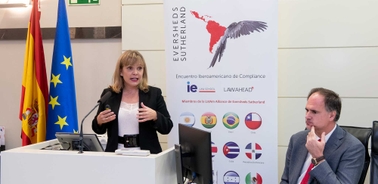- Home
- We Are Law School
- News
- Discussing Best Practices For Internal Compliance
Discussing best practices for internal compliance

On October 29, IE Law School welcomed the LatAm Alliance and other guests for the Ibero-American Conference on Compliance of Eversheds Sutherland. The Alliance, an innovative platform made up of 22 law firms from 17 countries, is an academic partner of the school with a commitment to upholding the highest standards in its legal services.
At the event’s “Best Practices for Developing Internal Investigations” roundtable, panelists came together to look at the importance of compliance in today’s world. Francisco Hernández-Castillo, Global General Counsel, and Javier Izquierdo, Responsible for Administration at ASG Homes, were joined by José Agustín Preciado from Attorneys-at-Law Fábrega Molino, and Florencia Castagnola, partner at Guyer & Regules.
Attendees, largely comprising compliance lawyers and internal compliance investigators, received a highly practical vision of compliance. Exploring topics such as the future of compliance and current trends in Ibero-America, speakers provided valuable real-world insights in a lively roundtable discussion.
Why we carry out internal investigations
Francisco Hernández-Castillo kicked off the discussion with the question “Why are internal investigations carried out?”. In his presentation, Hernández-Castillo explained that businesses in the US and EU—already the subject of increasing scrutiny—are now being joined under the spotlight by their counterparts in Latin America, Asia and the Middle East.
Expanding on why this is the case, he suggested two principal reasons. Firstly, cell phones (which he called “windows to the world”) are currently owned by a vast majority of the global population, and are a significant source of real-time data collection. Secondly, Hernández-Castillo pointed out the role played by government authorities, which provide the legal framework for both domestic and extraterritorial compliance.
Internal investigations have changed completely, so today’s businesses have to be informed and prepared in order to uphold current legislation. Globalization has produced new agreements between different authorities in different regions, presenting new challenges to investigators. Fundamentally, to be effective and fair, and investigation must be transparent, confidential, impartial, tread carefully around cultural and linguistic differences and clearly follow due process. It must also be accurately and comprehensively documented.
After looking at the complex nature of external investigations and talking about investigating allegations in the era of fake news, the discussion moved on to the role of privilege in the United States. In the US, compliance-related documentation and communication is not privileged. While 80 countries worldwide offer data protection legislation, with the EU’s GDPR being perhaps the flagship example, US businesses decide which information to disclose, making such disclosure a matter of strategy for some of them.
Such differences in policy from the EU are not unique to the US—asked about their own countries, the Uruguayan and Panamanian delegates had very different answers. While Uruguay has a well-developed and EU-compliant system, Panama has no such structure yet.
These examples offered clear evidence that, as Hernández-Castillo put it, “There isn’t just one right way to do it; it has to be case by case.”
The event provided an outstanding opportunity for professionals in the field to come together. There was a valuable exchange of ideas and insights into today’s ever-evolving and increasingly complex global legal sector.
Preemptive investigation as a way to promote compliance
The second part of the event, led by Javier Izquierdo, focused on preemptive investigation, particularly the prevention of money laundering and the financing of terrorism. Outlining the regulations of Ley 10/2010 to non-Spanish attendees, he advocated formal investigation of any new client. Official identification should be requested, and confirmation that payment is being made with clean money should be sought.
“You need to be careful and ensure you have the right documentation, such as a tax return,” he explained. According to Izquierdo, clients should be able to recognize that such investigations were being carried out in their best interests, as well as those of the organization.
José Agustín Preciado offered insight into the importance of perception in compliance. Following the infamous “Panama Papers” release, Preciado expressed that the world’s view of compliance in Panama has been skewed. “I would have called it something different, as 85% of this scandal took place outside of Panama,” he added, calling this another example of fake news.
Florencia Castagnola contrasted this with Uruguay’s experience, where an initial phase of low regulation, mainly carried out by banks, has been followed by a much stricter second phase partly driven by geopolitical dynamics.
The event was a success for all those involved. For María Jaureguizar Jimenez, an attendee who works in compliance management at Iberdrola, it offered the perfect setting for "high-quality networking and an engaging participatory dynamic during the sessions." By providing an outstanding opportunity for professionals in the field to come together, the event allowed for a valuable exchange of ideas and insights into today’s ever-evolving and increasingly complex global legal sector.
At IE Law School, we're committed to keeping our students at the cutting-edge of developments across the sector. Click here to learn more about our Master in Global Corporate Compliance and discover our top-ranked program offering today.